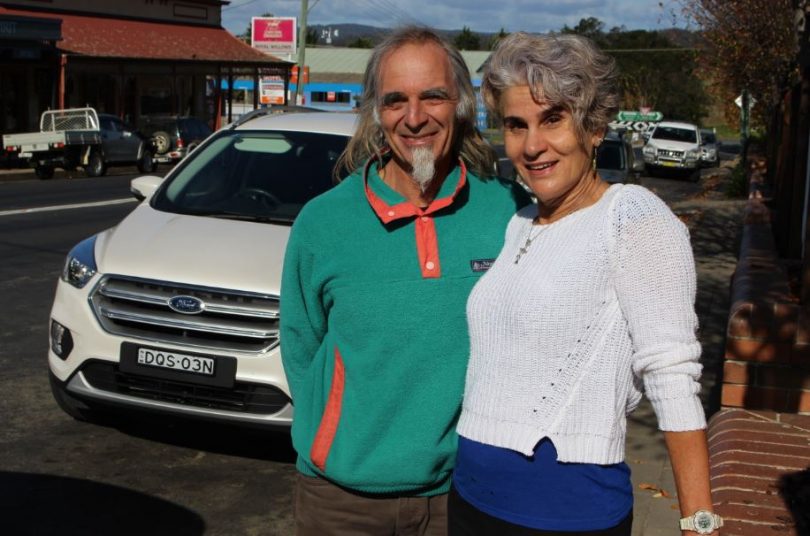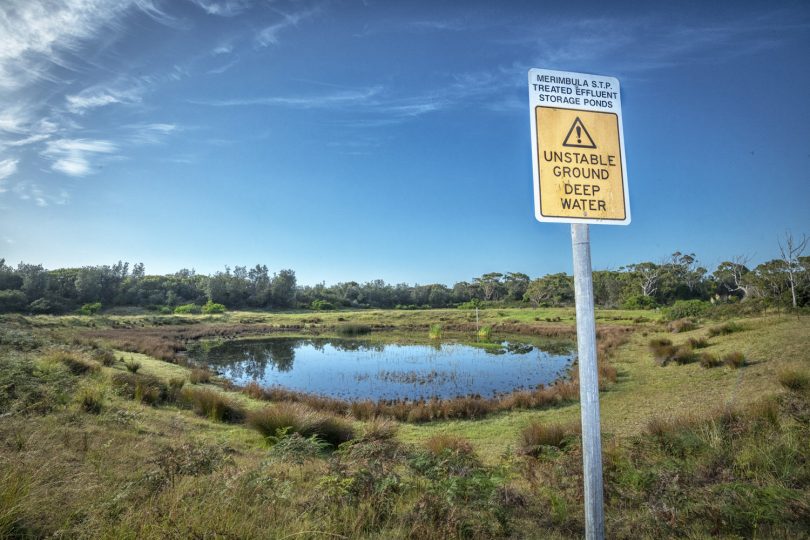
Marianne and Stephen Kambouridis of the Merimbula/Pambula Wastewater Alternatives group. Photo: Ian Campbell.
A group of locals concerned about the proposed ocean outfall in Merimbula Bay is calling for the project to be stopped so that alternatives can be reconsidered in a 2019 context.
“Please contact councilors, if they get enough flack from the public they are going to have to stop and listen,” says Marianne Kambouridis from the Merimbula/Pambula Wastewater Alternatives group.
In 2009 the NSW Environment Protection Authority instructed Bega Valley Shire Council to find better disposal methods for the treated effluent that comes from the Merimbula Sewage Treatment Plant (STP).
For the last 10 years, Council has had a period of grace and those existing methods have been allowed to roll on while alternatives are considered.
Currently, treated effluent from Merimbula STP goes four ways – the beach-face outfall halfway along Pambula – Merimbula Beach, dunal ex-filtration ponds in the sand dunes immediately behind the beach-face outfall, and to Pambula Merimbula Golf Club and Oaklands Farm for irrigation.
Most of the effluent is dumped rather than reused, with about a quarter of the treated water reused at the golf club and Oaklands.
Merimbula/Pambula Wastewater Alternatives want that reversed so that 80% is reused and 20% discharged into the environment.
“We need to make decisions where future generations will be grateful, not resentful of our actions, especially in light of climate change and drought,” Ms Kambouridis says.
“Decisions on how we treat our waste, are more than technical. They involve social and ethical values and costs that cannot be measured in dollars.
“FOGO has been a huge success in terms of waste management, ethics and our community values for our shire, let that inspire our discussion of this issue.
“We demand our council continue to apply the same insight into how we treat and dispose of our sewage.”

The current beach face outfall on Merimbula – Pambula Beach. Photo: Brent Occleshaw on behalf of BVSC
Council says it is committed to further reuse options as part of the proposed $30 million upgrade to the Merimbula STP, irrigation to the Pambula Sporting Complex is the example given. Ms Kambouridis wants Council to think bigger and bolder.
“We do not approve of the proposed outfall when the alternatives available are proven and environmentally ethical,” she says.
“Our group, Merimbula/Pambula Wastewater Alternatives, are advocating for a combination of options based on a higher quality tertiary treated effluent which allows for a broader range reuse opportunities.”
Ms Kambouridis accepts that an ocean outfall in some shape or form is needed but wants to see reuse rather than disposal as the focus of future plans. She points to reuse options currently in play for other regional communities including eco-forests, wetlands, and farm irrigation.
Prior to settling on the 5 km pipeline into Merimbula Bay as the preferred option Bega Valley Shire Council did consider a number of alternatives including further irrigation at Lochiel, Millingandi, and Wolumla. Even using the treated effluent as drinking water and piping it to Yellowpinch Dam was considered – all were rejected.
“Leaving it up to the experts only decreases public participation,” Ms Kambouridis says.
“It is this participation that will move politicians and bureaucracies into ethical action. Action that is not bound by economics, public image and power.”
The project has been listed as ‘State Significance Infrastructure’ implying that money from the NSW Government will follow – more than 10 years after the Government first raised the issue.
“That day is getting closer with the Environmental Impact Statement due in May next year followed by project approval five months later,” Mr Kambouridis says.
“If Council is genuinely committed to reuse as they claim, then our suggestions should be easily attainable and desirable.”

Dunal exfiltration ponds currently used by BVSC impact groundwater and Aboriginal heritage. Photo: Brent Occleshaw for BVSC.
Ms Kambouridis says the Clean Ocean Foundation is supporting the local campaign being lead by the Merimbula/Pambula Wastewater Alternatives group and is lobbying the Commonwealth Government to support Local Government in considering options beyond ocean outfall.
“Ten years ago when they first made the step towards this outfall, the technology wasn’t what it is now – there is a compelling argument to revisit this rather than – just get the job done,” Ms Kambouridis says.
“Right now, Council has tunnel vision.”







